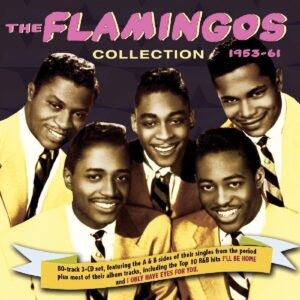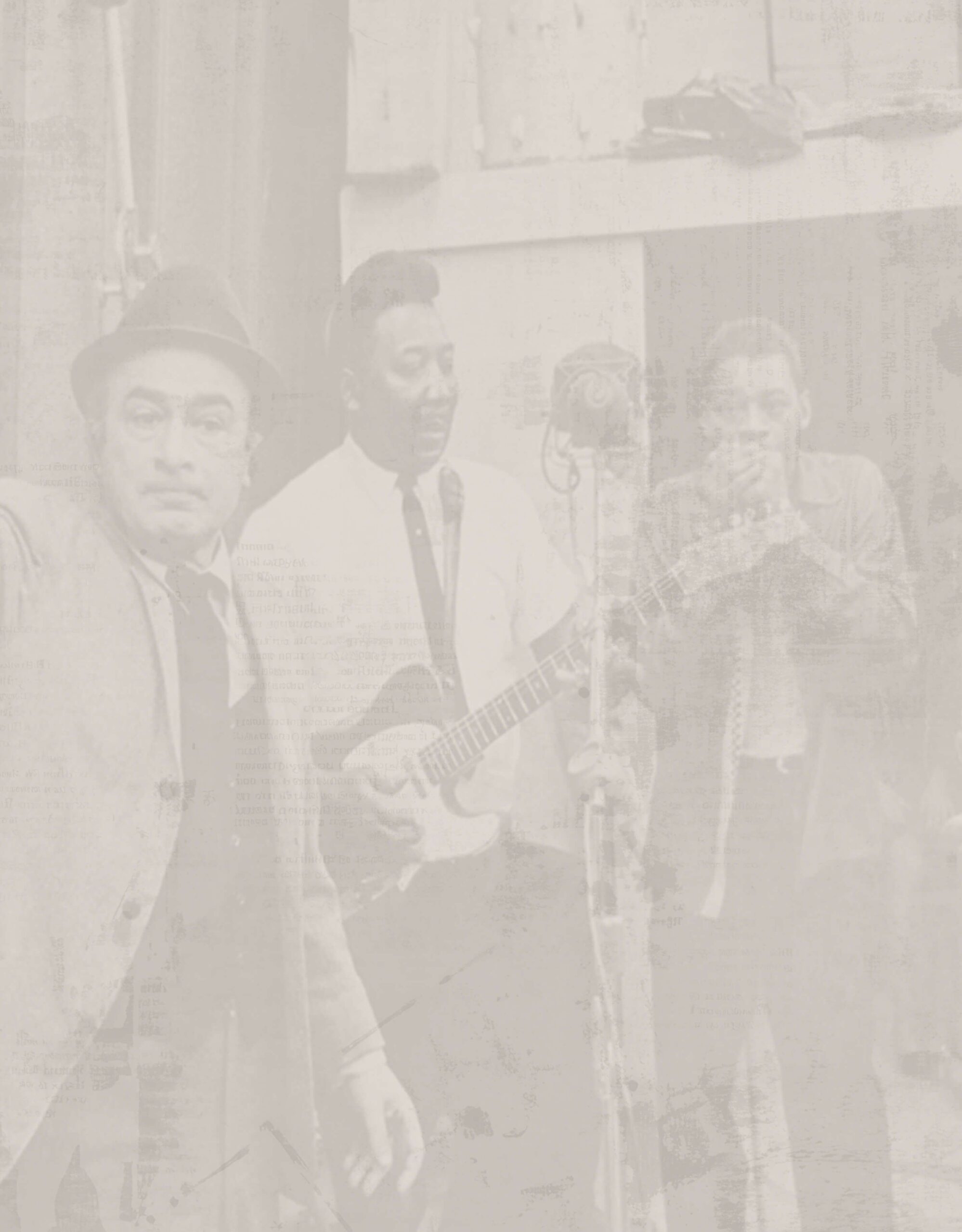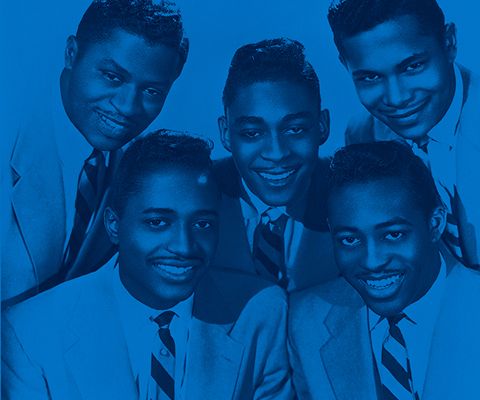The Flamingos
The Flamingos
“[The Flamingos are] a group that has inspired myself and so many singers and vocal groups around the world.” - Frankie Valli
Though the tenure of The Flamingos on the Chess family of labels was brief, it helped the company further establish itself as a home for talented vocal groups, not just bluesmen. It also served as a crucial stepping stone for the group as one of the most enduring architects of the sound of doo-wop.
Like Chess, The Flamingos were homegrown in Chicago - the brainchild of cousins Jacob (bass) and Ezekiel Carey (second tenor), Paul Wilson (baritone) and John E. Carter (first tenor). The early, oft-rotating lead tenor position was filled by Sollie McElroy, and after settling on The Flamingos as their band name (after considering The Swallows, The Five Flamingos and even El Flamingos), they’d start cutting their own material in 1952 and 1953, earning a regional hit with “Golden Teardrops,” penned by Carter and featuring such tight harmonies that some labels initially rejected them for being too good.
The talent scouts at Chess did not have this perception of the group. When they signed the quintet (by then featuring new lead Nate Nelson in place of McElroy) in 1955, they were taken by the group’s precision both in the studio and onstage. They were among the first vocal groups to add choreography to their live sets, and would even play their own instruments. Thanks to the distribution muscle of Chess’ Checker imprint, The Flamingos would score their first national hit with “I’ll Be Home,” recorded on just two microphones in Chess’ small office instead of a studio. The single reached No. 5 on Billboard’s R&B chart - but in a soon-routine set of circumstances, the Black act would find their song covered by pop crooner Pat Boone, whose softer version would become a crossover pop hit.
Despite promising recognition in the wake of “I’ll Be Home” - including a shared tour with Bill Haley and His Comets and The Platters, and an appearance in the jukebox musical Rock, Rock, Rock alongside fellow Chess signees like Chuck Berry and The Moonglows - The Flamingos would soon end their association with Chess, a setback compounded by the drafting of Ezekiel Carey and John E. Carter into the military in 1956. Jacob Carey, Wilson and Nelson would recruit vocalists Tommy Hunt and Terry “Buzzy” Johnson, welcoming Ezekiel Carey back when his service ended.
In 1959, The Flamingos would finally earn the crossover hit that eluded them with a take on the standard “I Only Have Eyes for You,” featuring Nelson’s tender lead and Johnson’s dramatic “shoo-bop, shoo-bop” vocal arrangements. The group line-up started to fracture in the ‘60s - former member John E. Carter, for his part, joined another vocal group on Chess, The Dells - but remains on the rock and roll touring circuit to this day, with Johnson leading the current iteration of the group. All eight of The Flamingos’ classic members - the Careys, Wilson, Carter, McElroy, Nelson, Hunt and Johnson - were inducted into the Rock and Roll Hall of Fame in 2001.
Though the tenure of The Flamingos on the Chess family of labels was brief, it helped the company further establish itself as a home for talented vocal groups, not just bluesmen. It also served as a crucial stepping stone for the group as one of the most enduring architects of the sound of doo-wop.
Like Chess, The Flamingos were homegrown in Chicago - the brainchild of cousins Jacob (bass) and Ezekiel Carey (second tenor), Paul Wilson (baritone) and John E. Carter (first tenor). The early, oft-rotating lead tenor position was filled by Sollie McElroy, and after settling on The Flamingos as their band name (after considering The Swallows, The Five Flamingos and even El Flamingos), they’d start cutting their own material in 1952 and 1953, earning a regional hit with “Golden Teardrops,” penned by Carter and featuring such tight harmonies that some labels initially rejected them for being too good.
The talent scouts at Chess did not have this perception of the group. When they signed the quintet (by then featuring new lead Nate Nelson in place of McElroy) in 1955, they were taken by the group’s precision both in the studio and onstage. They were among the first vocal groups to add choreography to their live sets, and would even play their own instruments. Thanks to the distribution muscle of Chess’ Checker imprint, The Flamingos would score their first national hit with “I’ll Be Home,” recorded on just two microphones in Chess’ small office instead of a studio. The single reached No. 5 on Billboard’s R&B chart - but in a soon-routine set of circumstances, the Black act would find their song covered by pop crooner Pat Boone, whose softer version would become a crossover pop hit.
Despite promising recognition in the wake of “I’ll Be Home” - including a shared tour with Bill Haley and His Comets and The Platters, and an appearance in the jukebox musical Rock, Rock, Rock alongside fellow Chess signees like Chuck Berry and The Moonglows - The Flamingos would soon end their association with Chess, a setback compounded by the drafting of Ezekiel Carey and John E. Carter into the military in 1956. Jacob Carey, Wilson and Nelson would recruit vocalists Tommy Hunt and Terry “Buzzy” Johnson, welcoming Ezekiel Carey back when his service ended.
In 1959, The Flamingos would finally earn the crossover hit that eluded them with a take on the standard “I Only Have Eyes for You,” featuring Nelson’s tender lead and Johnson’s dramatic “shoo-bop, shoo-bop” vocal arrangements. The group line-up started to fracture in the ‘60s - former member John E. Carter, for his part, joined another vocal group on Chess, The Dells - but remains on the rock and roll touring circuit to this day, with Johnson leading the current iteration of the group. All eight of The Flamingos’ classic members - the Careys, Wilson, Carter, McElroy, Nelson, Hunt and Johnson - were inducted into the Rock and Roll Hall of Fame in 2001.



